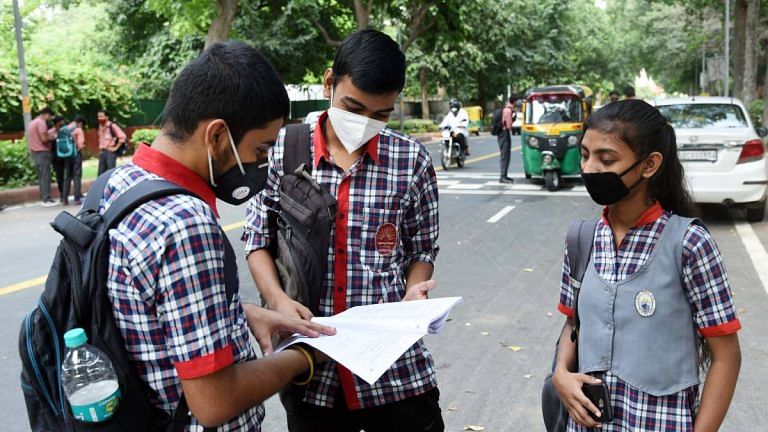New Delhi: The Election Commission (EC) has written to the Modi government, flagging “factual mistakes and infirmities” in NCERT social science textbooks, according to official records seen by ThePrint.
The poll watchdog has said it wants to vet the books for “correctness and relevance”, adding that the existing content “fails” to prepare students for making “ethical ballot decisions”.
The EC proposal is “an outcome of high-level correspondence starting from 2016, between the chief election commissioner and the minister of human resource development (MHRD)”, show the records.
The MHRD was renamed Ministry of Education in 2020.
The EC’s proposal on “gaps and suggested amendments to the curriculum” include two chapters — from the Class 6 and Class 10 social science textbooks — deleted by the NCERT in 2022 to ostensibly reduce the burden on students in light of the syllabus lag created by the Covid-19 pandemic.
The chapters are ‘Key elements of a Democratic Government’ in Class 6, and ‘Popular Struggles and Movements’ in Class 10. About the first, the EC said that “elaboration of conflict is totally unnecessary at this tender age”, while on the latter it observed that the chapter says “much about conflicts, struggles, popular movements, agitations with little about engaging young people into citizenship development for electoral participation”.
The 12-member committee set up by the Centre under former ISRO chairman K. Kasturirangan to revise the National Curriculum Framework — based on which new NCERT textbooks and syllabus are being developed — has also received the EC proposal, based on its chapter-wise scrutiny of Class 6-12 social science textbooks, the official records show.
The document on EC suggestions and observations is called ‘Mainstreaming of Electoral Literacy in Educational Institutions (Secondary and Senior Secondary Level) — Updated Proposal to the Ministry of Education, Department of School Education & Literacy, Government of India.
The document, the poll watchdog has said, is linked to “investment in the future of democracy”.
ThePrint has reached the EC, Education Ministry and NCERT by email for a comment. This report will be updated when a response is received.
Also Read: NCERT textbook revisions and politics go hand in hand. But it’s different this time
‘Wide gaps’
The dropped chapter in the Class 6 social science textbook introduced students to the concepts of equality, justice, apartheid in South Africa, movements led by Dalits, Adivasis, minorities, and discrimination. It pointed out how “religious processions and celebrations can sometimes lead to conflicts”.
On this chapter, the EC observed in its proposal that “instead of conflict and examples of solutions under ‘collective voice’, it would be appropriate to narrate solutions what democracy offers in a legitimate manner”.
Based on its scrutiny of the Class 10 social science textbook, the EC has said the chapter ‘Political Parties’ would require “vetting by the ECI as to the correctness, relevance and efficacy of the text”.
The chapter introduces students to political parties, including national and state parties in India, their foundational values and functions.
The dropped Class 10 chapter ‘Popular Struggles and Movements’ dealt with pressure groups such as the Medha Patkar-led National Alliance for People’s Movements, the Narmada Bachao Andolan, the 2006 protests against the monarchy in Nepal by Maoists and a seven-party alliance, and the water movement in Bolivia.
The “void” on electoral literacy in the Class 10 textbook, said the EC, “fails to make them (students) ready for any sort of electoral participation and leave aside, confident, informed and ethical ballot decisions”.
A running theme of the EC proposal is that the textbooks are not drafted to ensure citizenship development and future electoral participation.
It also questions the chapter ‘What is Democracy? Why Democracy?’ chapter in the Class 9 social science textbooks, saying its text needs “considered scrutiny by non-partisan experts in the light of world-class literature on the subject for the cause of a healthy citizenship development and electoral participation in the right perspective”.
“The content must help young people to appreciate their rights and responsibilities to be prepared as future voters,” the EC added. A chapter on ‘Electoral Politics’ in the same book, it said, “needs to be vetted by experts from the Election Commission and academics and wherever necessary rectified in the light of the provisions of the Constitution, electoral legislation and the subject wise manuals of the ECI so that the factual mistakes are eliminated”.
In general, the EC said, it found that the existing NCERT social science textbooks have “wide gaps” when compared to the curriculum framework drawn up in 2005.
“The content of the texts, pictures and illustrations lack coherence in delivery of desired objectives of the existing curriculum. Cocurriculum is weak and extra curriculum is either missing or negligible,” it added.
“The existing texts are inadequate for preparing young people for informed and ethical electoral participation as they achieve the age of eligibility. Basics of electoral literacy have been found missing in the text and need to be incorporated suitably.”
(Edited by Sunanda Ranjan)
Also Read: Panel on new NCERT social science curriculum wants ‘Bharat’, not India, in books — ‘unanimous view’

